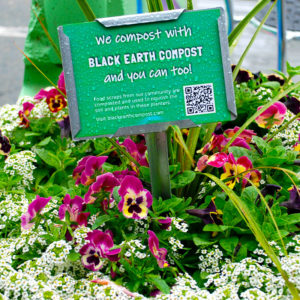Top: Dishwashing staff (above left) do the plate scraping and separation of postconsumer food scraps. Black Earth Compost services the 48-gallon outside carts weekly (above right).
Johnny’s Luncheonette (Johnny’s), a 25-year-old diner in Newton, Massachusetts, will soon have to comply with the Massachusetts Department of Environmental Protection’s (MassDEP) commercial organics waste ban, in effect since 2014. Starting November 1, 2022, the threshold for businesses to comply with the ban will drop from one ton/week to a half-ton/week of food waste. Johnny’s, which generates 600 to 700 pounds/week of food waste, is ahead of the compliance curve. The restaurant initiated a source separation program well ahead of the November 1 deadline. Collection and composting are provided by Black Earth Compost, based in Manchester (MA).
A video and case study about Johnny’s Luncheonette and its sustainability and recycling practices were developed by RecyclingWorks in Massachusetts (RecyclingWorks), a recycling assistance program, funded by MassDEP and delivered under contract by the Center for EcoTechnology. (This Brief is excerpted from the case study.) The program helps businesses and institutions reduce waste and maximize recycling, reuse, and food recovery opportunities. Kay and Kevin Masterson, owners of Johnny’s since 2014, reached out to RecyclingWorks to evaluate possible improvements to their recycling system and support implementation of a food scraps collection program. With staff already accustomed to a system of designated bins for recycling, a food scraps separation process was easy to introduce. To facilitate education around the improved waste diversion programs, RecyclingWorks helped Johnny’s design multilingual signage to identify acceptable and non-acceptable items for food scraps and recycling receptacles.
Because Johnny’s is a high-volume diner with limited kitchen space, 5-gallon buckets are conveniently located at prep stations to recover preconsumer scraps. Due to the configuration of the restaurant, the dishwashing staff carry out the plate scraping and separation of postconsumer food scraps. Any non-food items are removed from the plate and discarded, then the food scraps are scraped into additional 5-gallon buckets at the dishwashing station. Multilingual signage is displayed to aid the separation process, guiding new and existing team members. Once full, the 5-gallon buckets are emptied into 48-gallon outdoor carts lined with compostable bags that are held in place using old bicycle tire tubes. Three of these carts are picked up by Black Earth Compost weekly. After Johnny’s Luncheonette started separating food waste from the trash, staff noticed fewer birds, squirrels, and other unwanted intruders around their trash dumpsters. “Composting was easier than I thought it was going to be,” says Kay Masterson.

To close the restaurant’s loop, Johnny’s Luncheonette plans to apply Black Earth’s soil amendment to the planters on its outdoor patio next season. Photos courtesy of the Center for EcoTechnology
Black Earth Compost hauls the food scraps to its three large-scale composting operations. To close the restaurant’s loop, Johnny’s Luncheonette plans to apply Black Earth’s soil amendment to the planters on its outdoor patio next season. Signage on the planters links to Black Earth’s website, showing guests the connection between their plates’ food scraps and the nutrients that will feed the flowers beside them. By launching a new program well in advance of the lowered threshold for the MassDEP commercial organics waste ban, Johnny’s Luncheonette had room for trial and error without pressure. “It is important to celebrate small successes, encourage staff to get on board with this good work and avoid getting caught up in small imperfections,” notes Masterson. “Other restaurants [should] see how much [food waste] we’re diverting and learn about what Black Earth does… it’s such a virtuous cycle, and it’s great to be a part of it.”
Johnny’s has a strong relationship with Green Newton, a local climate advocacy organization that provides community education to promote sustainability. Johnny’s Luncheonette worked with Green Newton to create a few of the diner’s signature activity placemats. The next one to be created will dive into the natural process of composting, demonstrating a compost recipe and showing how microorganisms break down organic matter.













